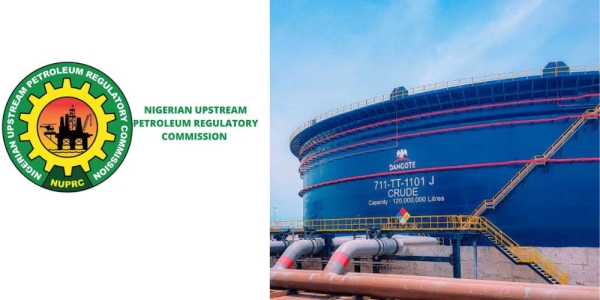… Refutes Dangote’s Weak Enforcement Claim
The Nigerian Upstream Petroleum Regulatory Commission (NUPRC) has refuted claims by the Dangote Petroleum Refinery and Petrochemicals and other players in the industry that it has been weak in the enforcement of the Domestic Crude Supply Obligation (DCSO) to local refineries.
The NUPRC took the position following revelations that it has facilitated the supply of over 32 million barrels of crude oil to the Dangote Refinery and other refineries despite the country’s weak oil output.
The NUPRC made the disclosure in a statement on Friday which was obtained by THE WHSTLER.
THE WHISTLER reported that Dangote group chief commercial officer, Rabiu Umar had claimed that the NNPC supplies only 33 per cent of crude to the Dangote Refinery. He had claimed that the refinery sources the remaining 67 per cent elsewhere.
Despite NUPRC’s efforts to enforce the crude oil obligations through the development of the Domestic Crude Supply Obligation (DCSO) framework, the Dangote Refinery also accused the NUPRC of weak enforcement of the DCSO in a letter which was obtained by THE WHISTLER.
The firm, however, retracted the claim in another statement signed by the Group Chief Branding and Communications Officer, Anthony Chiejina.
Chiejina said, “Our attention has been drawn to media reports alleging that the Dangote Refinery has backtracked by acknowledging that NNPC supplied about 60 per cent of the 50 million barrels we lifted.
“To clarify, we have never accused NNPC of not supplying us with crude. Our concern has always been that NUPRC is pushing but IOCs are not following the instructions to enforce the domestic crude supply obligation and ensure that we receive our full crude requirement from NNPC and the IOCs.”
Meanwhile, an earlier letter issued by the Dangote Refinery to the Commission Chief Executive (NUPRC) Gbenga Komolafe, dated July 24, 2024, commended the regulator for its enforcement of the DCSO.
“Let me once again commend you and your team for the successful development of the domestic crude supply obligation (DCSO) framework. This framework will lay the foundation for ensuring a stable and reliable supply of crude oil to local refineries,” the Chairman of Dangote Refinery, Aliko Dangote said in the letter.
Advertisement
But the regulator said that to ensure the enforcement of Section 109 of the Petroleum Industry Act, 2021, it has developed and gazette regulation of the Production Curtailment and Domestic Crude Oil Supply Obligation (DSO) Regulation 2023.
The regulator said it took an additional step to ensure that crude producers furnish the Commission with copies of all crude oil sales and purchase agreements entered or any security interest entered, that is tied to crude oil production.
“For effective implementation of the DCSO, the NUPRC established a working committee comprising of NUPRC, Oil Producers Trade Section (OPTS), the Independent Petroleum Producers Group (IPPG), Crude Oil Refinery-Owners Association of Nigeria (CORAN) and NUIMS. The NUPRC has facilitated domestic supply of crude oil to Dangote Refinery and other Refiners using the monthly Production curtailment platform.
“These strategic commitments to Nigeria’s energy security have led to the facilitation of the supply of 32 million barrels of crude to Dangote Refinery and other local producers in the first half of 2024,” NUPRC said.
A breakdown showed that nine refineries have benefitted from the 32,088,122 barrels of crude as Dangote alone enjoyed 29,047,098 barrels out of the total supply between January to June 2024.
The Warri Refinery received 949,670 barrels; NDPR-NDPR Refinery got 823,395 barrels of crude; the Port Harcourt Refinery received 471,123 barrels; Seplat-WPSOL Refinery was allocated 419,541 barrels while Waltersmith-WSPOL Refinery got 296,353 barrels.
Advertisement
According to the NUPRC, other beneficiaries were Edo Refinery that got 58,504 barrels of crude and Du-port Refinery that was supplied 22,438 barrels of crude.
The NUPRC said that the IOCs have also explained that they have pledged crude to their financiers, adding that the “whole transaction is guided by the ‘Doctrine of the Sanctity of Contracts’. The parties already agreed that the licensees would pay the cost of the development and they explained to the commission that most of the funding was provided by traders at a mutually agreed price.”
IOCs also highlighted some operational challenges on the part of refiners which the NUPRC as a regulator has consistently defended local refiners.
The regulator said that “In the pursuit of its mandate, if it becomes necessary for the NURC to withdraw licenses, the commission will do so but it will not resort to the ‘presumptuous and arbitrary’ withdrawal of licenses because of ‘Sanctity of Contract.’.
“However, the regulator as a subject matter expert is of the opinion that arbitrary revocation of licenses is not in the best interest of the country particularly in the era of low investment arising from the onslaught in energy transition.”
The NUPRC further gave Nigerians the opportunity to decide if extreme penal regulatory measures should be taken against IOCs.
NUPRC said, “While our dear President, Bola Ahmed Tinubu, has been vacating entry barriers to investment in oil and gas sector and introducing incentives to attract investments, it is now left for Nigerians to decide whether it is strategic for the NUPRC to apply ‘extreme penal regulatory measures’ in the enforcement of domestic supply obligations especially in the era of low investment, low production, low oil revenues and onslaught of energy transition with defunding of fossil fuel.”


